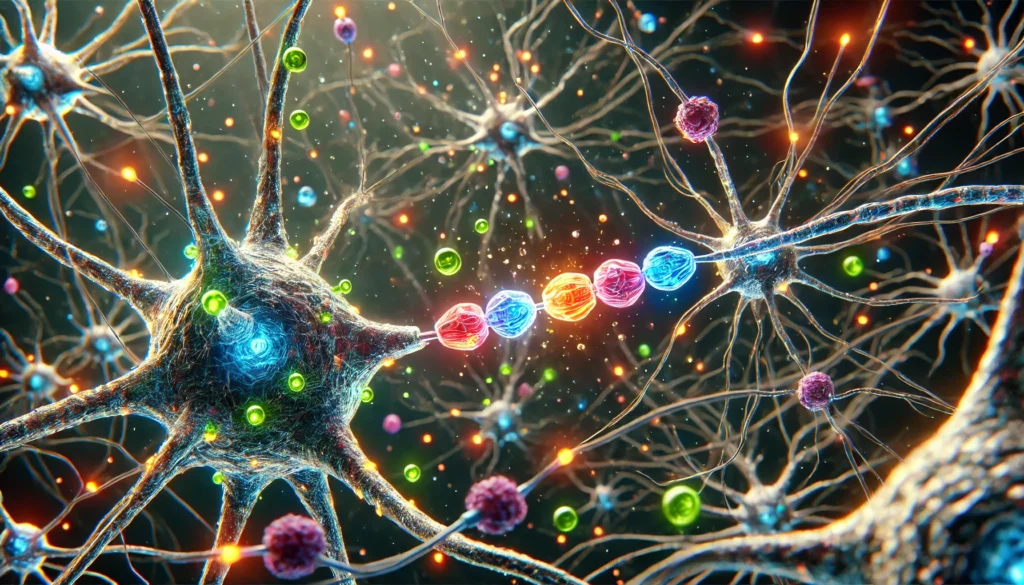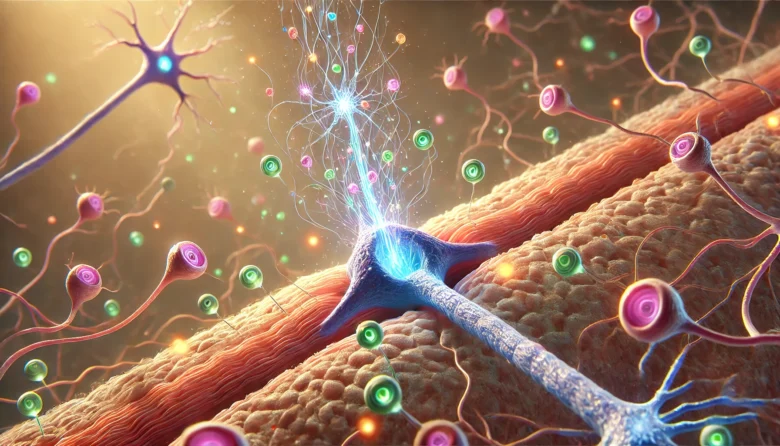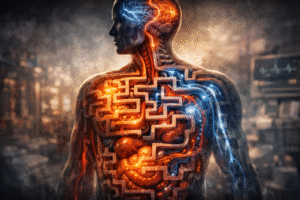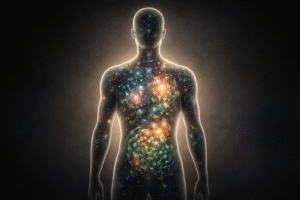Our brains are like a vast control centre, processing information, regulating emotions, and even directing our physical movements. But have you ever wondered how all this happens? The answer lies in the chemistry of neurotransmitters—tiny molecules that act as messengers between the brain’s nerve cells or neurons. In this blog, we’ll explore how neurotransmitters function, how they affect everything from mood to memory, and why understanding their chemistry is key to understanding the brain itself.
What Are Neurotransmitters?
Neurotransmitters are chemical substances that facilitate communication between neurons in the brain. Think of them as the brain’s messaging system, ensuring that signals get passed along correctly and efficiently. When neurons want to communicate, they release neurotransmitters into a small gap between cells called the synapse. These molecules then bind to receptors on the receiving neuron, triggering an electrical response.
There are many types of neurotransmitters, each playing a different role. For instance, dopamine is often linked with pleasure and reward, while serotonin helps regulate mood, sleep, and digestion. GABA (gamma-aminobutyric acid) calms the nervous system, while glutamate excites it. Understanding these chemical messengers helps us unravel the intricate links between human behaviour, mental health, and various diseases.

The Main Players: Key Neurotransmitters in the Brain
1. Dopamine: The Reward Molecule
Dopamine is one of the most well-known neurotransmitters, often dubbed the “feel-good” chemical. When you experience something pleasurable—whether it’s eating your favourite meal or accomplishing a goal—your brain releases dopamine. This not only makes you feel good but also motivates you to repeat the behaviour. For instance, when you get a like on social media, that small hit of dopamine is what makes you feel rewarded.
But dopamine does much more than just make you feel happy. It’s crucial for focus, learning, and motor control. In fact, disruptions or deficits in dopamine production have been associated with conditions like Parkinson’s disease, which affects motor functions, and schizophrenia, a disorder that alters thinking and perception.
2. Serotonin: The Mood Stabilizer
Have you ever felt more relaxed and balanced after taking a stroll or catching up with a friend? That’s serotonin at work. This neurotransmitter helps regulate mood, sleep cycles, and even appetite. Elevated serotonin levels contribute to feelings of happiness and emotional well-being, while reduced levels are often connected to anxiety and depression.
Selective serotonin reuptake inhibitors (SSRIs), commonly used antidepressants, function by boosting the availability of serotonin in the brain. By blocking its reabsorption, SSRIs allow more serotonin to be available in the synapse, making it easier for the brain to regulate mood.
3. GABA: The Brain’s Chill Pill
When life gets stressful, you can thank GABA for stepping in to calm things down. GABA (gamma-aminobutyric acid) is the brain’s main inhibitory neurotransmitter, which means it reduces neural activity. This helps keep you from feeling overwhelmed by external stimuli, balancing excitement and relaxation.
GABA also plays a role in sleep. When you’re getting ready for bed, GABA helps your brain “slow down,” preparing your body for rest. Interestingly, many anti-anxiety medications, such as benzodiazepines, enhance GABA’s effects to induce a calming effect in the body.
4. Glutamate: The Brain’s Accelerator
If GABA is the brake, then glutamate is the accelerator. Glutamate, the brain’s most prevalent excitatory neurotransmitter, plays an essential role in processes like learning and memory formation. When neurons need to send fast, sharp signals, they release glutamate to stimulate the receiving neurons.
However, too much glutamate can be harmful. Excessive glutamate activity is linked to neurodegenerative conditions like Alzheimer’s and ALS (amyotrophic lateral sclerosis), where neurons become overstimulated and eventually die. This phenomenon, known as excitotoxicity, is a growing area of research in understanding brain health.
Neurotransmitter Imbalances and Mental Health
Neurotransmitter imbalances are often linked to a wide range of mental health conditions. For example, low serotonin levels can result in depression, while an imbalance of dopamine has been linked to both schizophrenia and addiction. Let’s take a closer look at how these imbalances can affect mental health:
1. Depression and Anxiety: A Serotonin Deficiency?
Depression is frequently linked to reduced serotonin activity in the brain. When serotonin levels are low, it becomes more difficult for the brain to regulate mood effectively. This is why SSRIs (Selective Serotonin Reuptake Inhibitors) are frequently prescribed as a treatment for depression—they work by making more serotonin available for brain activity.
Anxiety, too, is connected to neurotransmitter imbalances, particularly low GABA activity. Without sufficient GABA, the brain’s “braking system” doesn’t work effectively, leading to heightened nervousness and stress. This is where anti-anxiety medications that boost GABA activity come into play.
2. Schizophrenia and Dopamine Dysfunction
Schizophrenia, a disorder marked by hallucinations, delusions, and disorganized thoughts, is strongly associated with an excess of dopamine in the brain. Drugs that reduce dopamine levels, known as antipsychotics, are commonly used to treat the condition. On the other hand, insufficient dopamine levels can lead to an inability to feel pleasure or motivation, a condition known as anhedonia, which is common in people with schizophrenia.
3. Addiction and the Dopamine Cycle
Addiction is deeply tied to dopamine. Whether it’s substances like drugs or behaviours like gambling, anything that activates the brain’s reward system by releasing dopamine can become addictive. Repeated stimulation of the brain’s dopamine system can eventually alter its structure, reducing the ability to experience pleasure from everyday activities and perpetuating the cycle of addiction.
Conclusion: The Importance of Balance
Neurotransmitters play a vital role in everything from mood regulation to memory formation. Understanding their chemistry can shed light on both normal brain functions and mental health disorders. Maintaining a balanced level of neurotransmitters is vital for mental health, and ongoing medical research continues to reveal new ways to support this balance through lifestyle changes and medications.
So next time you feel happy, calm, or even stressed, remember—there’s a lot of chemistry happening in your brain, all driven by the complex world of neurotransmitters!
Author’s Note
The brain is a fascinating organ, and neurotransmitters are the key players in keeping everything in check. My hope with this blog was to make the complex science behind neurotransmitters easy to understand and relatable to everyday experiences. It’s truly amazing how much chemistry is involved in shaping who we are!
G.C., Ecosociosphere contributor.
References and Further Reading
- Harvard Health Publishing: Understanding Neurotransmitters
- Homeostasis GCSE Revision Quiz – Trivia & Questions. https://www.proprofs.com/quiz-school/story.php?title=mji3mdu4mg5ht4




